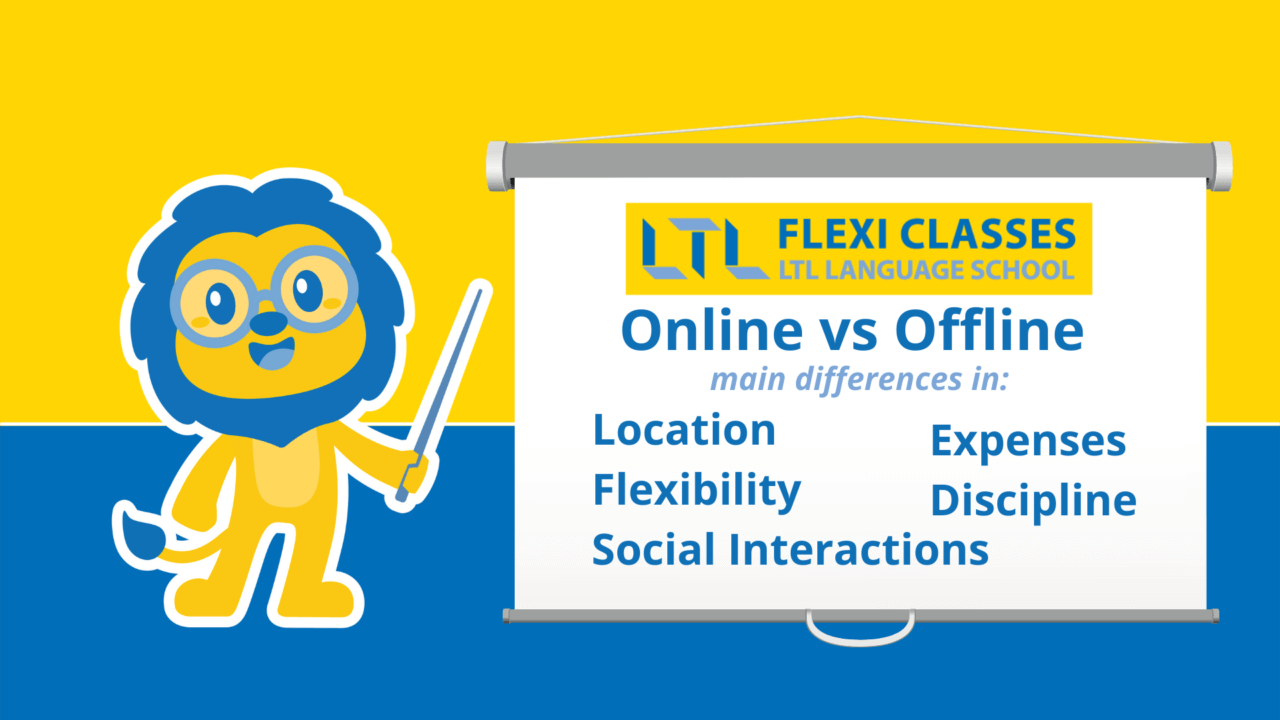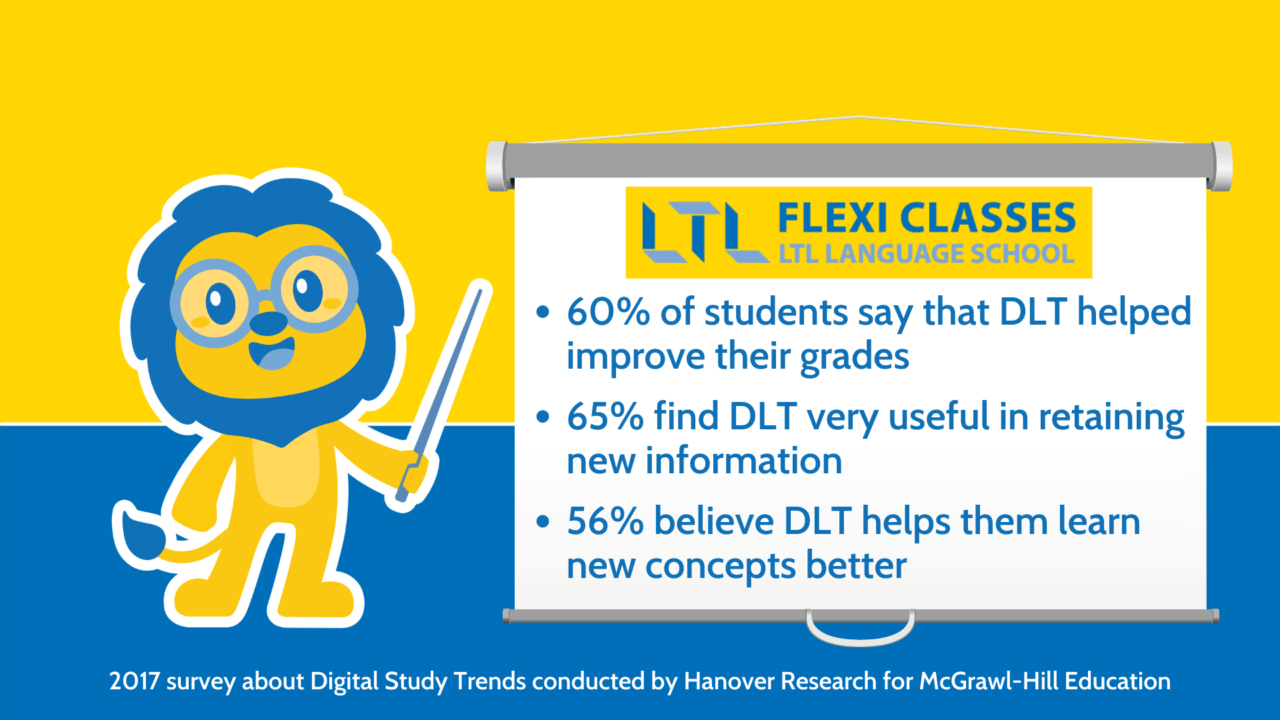The Battle of This Generation // Online vs Offline Education 💥
OK time to set the record straight with an incredibly common question! Which is best Online vs Offline Education.
I am preeetty sure you have at least once in your life considered taking an online course, attend a free class online, or even one full semester program online.
No? Not even once?
Come on then, I’ll show you why the question of online learning vs offline learning is such a big deal nowadays.
If you are hesitating between taking lessons online, or go to an actual school with classmates for your education, this blog might help you see the pros and cons of each kind of learning, and eventually help make a decision.
In this blog we will answer the most frequently asked questions and bring more details to this very relevant issue of our generation.
DISCLAIMER – Every person is different, and every teaching method does not fit everyone. So be aware that there is no two similar cases and you need to take into account what would work for you and only YOU.

FAQ #1 | What are the main differences between Online vs Offline Learning?
FAQ #2 | What are the advantages and disadvantages of Online Learning?
FAQ #3 | Is Online Learning just as effective as Offline Learning?
FAQ #4 | Which study is better Online or Offline?
Online vs Offline Education | Interesting Facts
Online vs Offline Education | How to learn a language online
What are the main differences between Online vs Offline Education?
Let’s start off with the basics and define exactly what online and offline education means.

Online Education – Online Education is a very flexible learning system that allows students to study solely via the internet on their own computer at home, or wherever they see fit.
Basically, student-teacher face to face meetings are not required, allowing students to study anywhere in the world.
NOTE – There are several types of Online Learning. In this blog, Online Education will mainly refer to Online Programs where students meet their teacher for class through a software such as Skype or Zoom.
Offline Education – Also referred to as traditional training. Offline Education means a student needs to go in a school, in a classroom, and attend a class face to face with a teacher.
So you got it, the main difference between online education vs offline education is the location of the the learning process.
Another key difference between online learning vs offline learning is the flexibility of the classes.
Whilst offline learning requires you to physically travel to a training centre or a school and be present at fixed hours, online learning allows you to study wherever you want, whenever you want.
Unless, of course, you have an arranged schedule decided in advance with your teacher.
A third difference between online learning vs offline learning is the student-teacher interaction.
In an offline setting, students listen to long lectures and take notes, sometimes easily get bored and might doze off a little.
With online classes, and new technology teaching techniques such as interactive whiteboards and videos for example, students engage with the class and activities given by the teacher.
However! As you will see further down below, even though digital teaching techniques do improve students’ class engagement with the lessons and activities, it is not the case for student to student interactions…
Which leads us directly to our next question:
What are the advantages and disadvantages of Online Education?
You already know that as with pretty much everything on this planet, Online and Offline Education have pros AND cons.
Online is the latest trending teaching method and growing in popularity by the day, let’s have a look at Online first:
| Benefits of Online Education | Disadvantages of Online Education |
|---|---|
| Location doesn’t matter | Isolating |
| Flexible hours | No competition |
| Time saving | No interpersonal skills development |
| Cheaper | Limited topics |
| Convenient | Must have self discipline |
| Class recorded |
Let’s now have a look at Offline Education’s benefits and disadvantages before we talk about them both Online and Offline in more details:
| Benefits of Offline Education | Disadvantages of Offline Education |
|---|---|
| Individualised monitoring | Fixed location |
| Structured & disciplined setting | Fixed schedule |
| Face to face interactions | Study materials |
| Interpersonal skills development | Dependency on the teachers |
| Competitive atmosphere | Transport & Accommodation |
Both Online and Offline have many benefits and disadvantages and even though what can be called “benefit” and “disadvantage” depends on one’s point of view, these are the main aspects discussed amongst students.
Let’s have a look in more details at the main benefits and disadvantages:
Location & Time
Location and time is the MAIN and biggest benefit of Online learning that you should remember here.
Whereas offline learning takes place in a fixed location, with a fixed schedule and requires you to travel and be on time, online learning is the opposite.
Not that you don’t have to be on time, especially in the case where you have an online teacher and decided on a schedule with them, but Online Learning allows you to study wherever and whenever.
Let’s say you have children and wish to get a degree, but still have to stay home to take care of the kids, Online Learning will make that possible for you.
Let’s say you needed to find a job and didn’t have the chance to finish your curriculum and graduate university because, well…life, Online Learning will make that possible for you.
Let’s say you want to learn a foreign language but don’t have the time nor the money to study in that country, again, Online Learning will make that possible for you.
I can go on with even more examples, but I think you got the idea.
Expenses
Getting quality education is expensive, we all know that.
And I am not only speaking about the scholar fees, but also the travel to the place of learning, the commute, the accommodation if the training center is not nearby, the textbooks, extra-curricular activities and so on.
Online learning is usually cheaper in scholar and booking fees, and as study materials are all online, there is no need to buy textbooks and manuals.
Since you are learning from home you won’t have expenses in petrol for your car, or for public transportation to the training centre.
The biggest saver of money? There is no need to find further accommodation and spend hundreds in rent every month.
Online Education is cheaper in that sense, and more convenient.

Social interactions
So yes, Online Learning is far less expensive, more convenient and flexible, but one major thing to mention is the lack of social interactions online.
And what I mean by that, is that with Online Classes, you don’t get that morning coffee with your classmates, those small chats in the corridor in between classes, the precious break during a long lecture where you can ask questions to the teacher….
In that sense, Online Learning can become quite isolating, as the level of human interaction is kept to minimum.
With Online Education, student to student engagement is very low.
There are less spontaneous debates in class and exchanges of ideas, as everyone is comfortably seated behind a screen, the screen maintaining everyone at a distance. Both virtually and relational-wise.
Another aspect of online learning we might take into account is that, over time, and especially if the online class concerns younger students, this distance in relations with other people might cause a lack of interpersonal skills development.
With offline learning, young students are all in a classroom, they develop crucial qualities such as patience and team spirit, and most importantly, respect.
It can be hard to create the same environment online, and for the teacher to build such aa space online is very complex.
However, with teachers’ experience and the best softwares, an online program for younger students is a great option.

Why Intensive Is Best // Learning Chinese In The Shortest Possible Time
There are so many ways to learn Mandarin so we do we believe so strongly in an Intensive Chinese Course in China? Give us 5 minutes and we’ll explain why!
Self discipline
Self-discipline is by definition the ability to have control and motivate yourself, which let’s be honest, is not always easy!
Studying in class at school is already in itself challenging. There is always the temptation of chatting with your classmates, watch out the window, daydream…
Well, studying at home online is as challenging.
There are no classmates next to you sure, but there are a lot of other distractions such as social media, TV, playing games on the phone. The family can even also be distracting sometimes!
In an offline setting, the class is disciplined with the teacher always checking if students are indeed focused on the class and not doing anything else, coming to them physically to remind them to focus.
Not so easy to do screen to screen!
Online learning requires a lot of self-discipline as students will have less interaction with their teachers, and thus also need a strong motivation.


Is Online just as effective as Offline Learning?
There is no definite answer to this question. Only because, the efficiency of a class, being online or offline, all depends on one’s motivation and drive to success.
As we saw previously online learning requires a lot of self discipline. You need to get up, open your laptop and be there during class without anyone always reminding you to be there.
If you don’t want to join the online class, the teacher won’t come for you. But you’ll get behind real quick. That’s where self-discipline comes in.
Just as in an offline setting, online learning requires you to do homework, research, group assignments and turn in papers on time. So nothing new here.
What will be different though in an online course, is the use of digital learning technology such as videos, interactive white boards, games and other online study material you can access anywhere, anytime, with a laptop, tablet or mobile phone.
Also the opportunity to engage with more day-to-day resources as additional study resources and integrating it into your habits, such as social media and shows in the language you’re learning.
Through digital learning resources, engagement with the class activities is increased, students have more fun interacting with the lessons and as a consequence will learn better and faster, than in traditional learning.
Check out our Online vs Offline learning facts right now for the exact statistics.


8 🗝 Benefits of Learning Mandarin 🤩 How It Improved My Life
The benefits of learning Mandarin are probably greater than you think. Learning Chinese cna take you far in many walks of life, but how exactly?
Which study is better, online or offline?
Again, this question is difficult to answer, as everyone’s situation is different. One might prefer a type of learning rather than the other according to their needs and availabilities.
If you have a training center close to your location, prefer to travel and study in another place than your hometown, then offline learning is absolutely fine.
If you prefer to stay home, need more flexible hours, don’t have the budget for a far away school or just learn better with digital technologies, then online learning is a great option.
Online learning has proved efficient in providing a good work-life balance, allowing more possibilities than offline learning.
Online vs Offline Education – Conclusion
Both online and offline have benefits and short comings, yes. And that is exactly why an education including both systems in a program with the use of technology would indeed create a very powerful education.
Not only would it allow students to engage and exist in a group in an offline setting, but they could also get a more engaging behaviour and stronger interest in an online class with the help of digital learning resources.
Nowadays, new technologies being so easily accessible to everyone and with young generations used to use the internet and the virtual world every day, having more visual and interactive study materials is becoming way more engaging than sticking to the old fashioned school book.
SO, to sum up about online education.
If you are motivated, well-organised and have self discipline, would prefer to study at more flexible times and at your chosen location, then Online learning would be a perfect fit for you and as efficient as offline learning.
It is all about MOTIVATION and SELF-DISCIPLINE.
Everyone’s different, we all have different background and study pace.
Certain study methods will be efficient to some and to others not at all, we all live in different environments and don’t all have the same access to education.
Most important is, do you research, take your time, contact the relevant people from the education you’d like to get. Consider all your options, make a choice depending on what feels right for you, and keep that fire going 🔥
Online vs Offline Education – Interesting Facts
Online Learning is becoming increasingly popular. If this is something you’d be interested in but are too afraid to jump in and start this new adventure even though you read all of the above, here are a few statistics to help you see how this could be a great option.
In 2017 a survey about Digital Study Trends was conducted by Hanover Research on behalf of McGrawl-Hill Education to try and understand college students’ digital behaviour and preferences.
Source
Around 1,005 completed answers were analysed and the resulting statistics found many interesting facts, such as students are more likely to choose classes that use digital learning technology (DLT), and that it has proven very useful in their studies and improved their grades.
Here are more specific numbers:
- 60% indicates that digital learning technology helped improve their grades
- 68% found DLT to be useful in their academic life with 71% finding it very easy to use
- 86% use a laptop to study and 72% for homework
- 56% believe DLT helps them learn new concepts better
- 65% find DLT very useful in retaining new information
It is equally important to mention that this survey has also found that DLT is not improving class participation in an online class setting.
Student to student engagement is also very low, despite all the other helpful aspects of DLT in education.
So, again, it all comes back to your own specific needs and requirements, as well as if you think an online setting is comfortable enough for you to focus on the lesson and actually study.

Online vs Offline Education – How to learn a language online?
I promise, learning an language online is absolutely POSSIBLE.
Of course that at some point you’ll need to interact with a native speaker of your target language, but the internet is FULL of learning resources to help you get started and improve your skills.
Yes, the internet is a very messy place, so here is some advice on how to learn a language online.
First of all, get your motivation up because this is going to be a long (but enjoyable) adventure.
The very first learning resource that might come to mind when thinking about how to learn a new language, is to have a look at some learning apps.
And YES, this is a perfectly fine way to start getting an interest in the language!
Let’s take Mandarin Chinese for example.
There are many learning apps to choose from and it is the perfect way to get familiar with the language and have a feel if it is really a language you want to learn.
Be it with Duolingo, Lingodeer, Drops, Super Chinese or any other, you should definitely start with learning the tones.
Mandarin Chinese is a tonal language, and you MUST learn them in order to make things easier in your learning journey.
Check them out right now 👇
Once you get your tones mastered and learned a little bit of Chinese grammar, discovered how the pinyin system works and also what a character looks like, you can start watching movies and dramas to improve your listening skills.
If you don’t recognise even one word, well that’s ok!
Watching and listening will not only help you get a better understanding of the phonetics, but you’ll also learn more about the Chinese culture and China in general.
Set up the subtitles in both Chinese and your native language, and you’ll learn new things without making any effort!
If you don’t really have the time to sit and watch a movie, listen to songs.
Chinese music is as diverse as any other, with many different music styles and artists to choose from.
You can also try to:
- Learn through a podcast
- Find free classes online
- Meet Chinese friends
- Find a language partner
- Join a Chinese learning group
- Follow Chinese learning accounts on socials
- Buy school books to learn the basics
I get it, learning Chinese from scratch only using this kind of resources can be a bit tenuous and it definitely lacks a lot when it comes to speaking and interacting in an easy way and even more so, adapted to your actual level.
That is exactly why you should book classes with a native teacher, and learn in a structured setting. Especially so, if you are learning Chinese from zero or want to make fast progress.
The only thing you need to remember is that it is absolutely possible to learn a foreign language online if you can’t visit the country yet.
BONUS – Tips & Tricks to Optimise Online Learning
Online learning at home requires a strong motivation as well as self discipline, we just saw that.
Don’t be too afraid of taking online classes though, there are a lot of tips and tricks out here to help you optimise your online education and get the best out of it!
1 – Preparation
There is nothing worse than having technical issues right before a class starts!
Make sure to prepare for your class in advance, so if any issue arises you can fix it in time.
Check your webcam, microphone and internet connection. Switch off all Bluetooth devices to avoid any interferences during the class.
Using a smartphone or a tablet is fine, but in our experience, using a laptop is much more effective, and enable a stronger internet connexion.
Make sure you are in a quiet environment, no distractions around, no background noise. Switch off your mobile phone and make sure no one will interrupt during your lesson.
Get your notepad, pencils and any study material ready. Hopefully you’ll have done your homework too, so you can easily follow the class!
Finally, if using Zoom, as we do during our online classes, use the record button to re-watch your lesson and review the parts you didn’t get right.
2 – Learn after class
Some tips are so easy to set up, you can even start right after reading this blog!
Do you usually use post-it notes in your studies? What about putting them all over the house to help you learn?
Yes, you read that correctly, one tip to learn and review more vocabulary is to put post-it notes all over the house.
And most importantly, in places you often go to (the toilet!) so you always have Chinese words and characters in front of you.
Another very easy trick to learn Chinese you can implement right away, is to change all your electronic devices language to Chinese.
I know, I know, it does sound very scary said like that!! But I promise it is not as daunting as it sounds.
Every time you click on something, you’ll have to look at the characters, and the more you use your devices the more you’ll remember these words.
If you don’t know the character or the word, you’ll have to look it up in the dictionary, another wonderful way to learn vocabulary is to actually go looking for it manually.
Speaking of devices, apps are a fantastic way to review and learn Chinese.
Have 5 minutes to kill? Use an app. Bored in the commute? Use an app. Waiting in a long line to get coffee? Use an app.
See? So many ways to optimise time to learn Chinese.
One last tip to share here is a very easy one, and can help you relax but study at the same time (there is actually a lot more in this blog).
Watch movies and TV shows in Chinese! Switch on the Chinese subtitles to help understand and practice listening and reading at the same time, while enjoying an interesting story.
Watching Chinese TV will actually also help you discover more about the country, the culture and the traditions.
If you do not get a lot of listening practice, this a fun and efficient way to get some.
Let us know in the comments YOUR tips to help learn Chinese more easily!

If you enjoyed our big city battle we think you’ll also like our article comparing three more big hitters!
Japanese vs Korean vs Chinese – which is really the hardest to learn?! We reveal all.
Online vs Offline Education – FAQ’s
What is Online learning?
Online Education, or online learning, is a very flexible learning system that allows students to study solely via the internet on their own computer at home, or wherever they see fit.
Basically, student-teacher face to face meetings are not required, allowing students to study anywhere in the world.
What is Offline learning?
Also referred to as traditional training, Offline Education means a student needs to go in a school, in a classroom, and attend a class face to face with a teacher.
What is better Online learning or Offline learning?
This question is difficult to answer, as everyone’s situation is different and one might prefer a type of learning rather than the other according to their needs and availabilities.
If you can’t travel, have a job, need to stay home for any reason, an online course will be a great option as it is more flexible and convenient than offline learning.
How to study Online?
There are many ways you can study online. Let’s say, you want to learn a new language.
First of all, and the most efficient way to do it, is to book an online course with a teacher. This way you will have a very structured education as well as all the learning materials needed.
You can then also download some apps, watch movies, TV shows, listen to songs, find some free classes on learning groups on socials, find a language partner on specialised websites, find free virtual resources to self study at home, and so much more!
Can I get Chinese lessons online?
YES! It is possible to study Chinese online.
At LTL we offer online group classes, individual classes, online semesters and a lot more. Let us know what kind of program you’d like as well as your goal and we will create the best program from you.
Want more from LTL?
Want to learn Chinese from the comfort of you own home? Then Online Chinese lessons might be the thing for you.
If you wish to hear more from LTL Mandarin School why not join our mailing list.
We give plenty of handy information on learning Chinese, useful apps to learn the language and everything going on at our LTL schools! Sign up below and become part of our ever growing community!
















 Hi, my name is Manuel! I am from Spain and I am a Student Advisor at LTL. I’m now based at our Seoul School after living 3 years in Taipei.
Hi, my name is Manuel! I am from Spain and I am a Student Advisor at LTL. I’m now based at our Seoul School after living 3 years in Taipei. Hi, my name is Mojca! I am from Slovenia in Europe and I work as a student advisor at our Shanghai school.
Hi, my name is Mojca! I am from Slovenia in Europe and I work as a student advisor at our Shanghai school.





17 comments
Fantastic rundown of pros and cons Marine
Thanks for the comment Sam!
I'll always prefer offline but I must admit the more I take online, the more I warm to it
Completely understand Zoe. Something about offline that is not possible to replicate online, but we do love the flexibility online brings.
It will change the world as we know it for sure.
[…] Marine Colliot 2020, accessed in 2 march 2021 https://ltl-school.com/online-vs-offline/#chapter-3 […]
I agree that online classes at home require a lot of motivation and self-discipline. My son wants to participate in an online class this summer since he would be staying mostly at home. I'll share this with him later. Thank you!
Thanks for your comment Levi 🙂
Thanks for this! will help in debating haha!
(im taking it for fun)
Thanks Brendan, hope it's useful!!
[…] compared to online education. Although you must consider the tuition fee to remain the same in both modes of education, the visible difference arises due to the presence of additional charges such as conveyance fees […]
I concur that online classes at home require a great deal of inspiration and self-control.
thank you for sharing. but it depend's on student to know more here is a online and offline class center
According to me traditional approaches have to be upgraded to meet modern necessities .Online education helps a student to study irrespective of their time / location.
Thanks for your comment 🙂
According to me these depends on the students perspective, as everyone demands and needs different. For me online works best. it gives flexibility to my schedule and also saves time. Thankyou for sharing this !!
Glad you enjoyed it and thanks for commenting.
[…] To reveal more on Competition in both mediums. […]